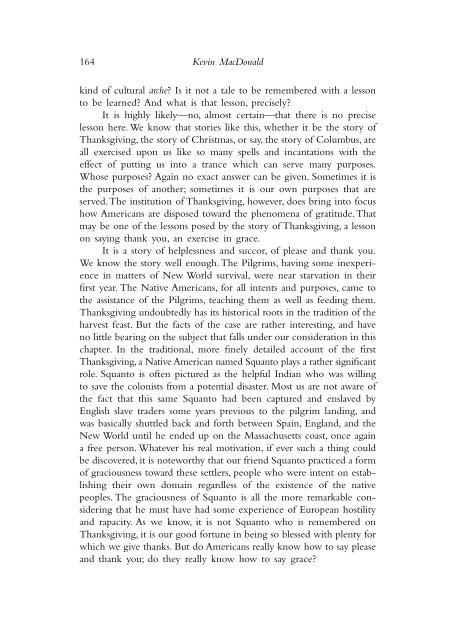You also want an ePaper? Increase the reach of your titles
YUMPU automatically turns print PDFs into web optimized ePapers that Google loves.
164 Kevin MacDonald<br />
kind <strong>of</strong> cultural arche? Is it not a tale to be remembered with a lesson<br />
to be learned? And what is that lesson, precisely?<br />
It is highly likely—no, almost certain—that <strong>the</strong>re is no precise<br />
lesson here. We know that stories like this, whe<strong>the</strong>r it be <strong>the</strong> story <strong>of</strong><br />
Thanksgiving, <strong>the</strong> story <strong>of</strong> Christmas, or say, <strong>the</strong> story <strong>of</strong> Columbus, are<br />
all exercised upon us like so many spells and incantations with <strong>the</strong><br />
effect <strong>of</strong> putting us into a trance which can serve many purposes.<br />
Whose purposes? Again no exact answer can be given. Sometimes it is<br />
<strong>the</strong> purposes <strong>of</strong> ano<strong>the</strong>r; sometimes it is our own purposes that are<br />
served. The institution <strong>of</strong> Thanksgiving, however, does bring into focus<br />
how <strong>American</strong>s are disposed toward <strong>the</strong> phenomena <strong>of</strong> gratitude. That<br />
may be one <strong>of</strong> <strong>the</strong> lessons posed by <strong>the</strong> story <strong>of</strong> Thanksgiving, a lesson<br />
on saying thank you, an exercise in grace.<br />
It is a story <strong>of</strong> helplessness and succor, <strong>of</strong> please and thank you.<br />
We know <strong>the</strong> story well enough. The Pilgrims, having some inexperience<br />
in matters <strong>of</strong> New World survival, were near starvation in <strong>the</strong>ir<br />
first year. The Native <strong>American</strong>s, for all intents and purposes, came to<br />
<strong>the</strong> assistance <strong>of</strong> <strong>the</strong> Pilgrims, teaching <strong>the</strong>m as well as feeding <strong>the</strong>m.<br />
Thanksgiving undoubtedly has its historical roots in <strong>the</strong> tradition <strong>of</strong> <strong>the</strong><br />
harvest feast. But <strong>the</strong> facts <strong>of</strong> <strong>the</strong> case are ra<strong>the</strong>r interesting, and have<br />
no little bearing on <strong>the</strong> subject that falls under our consideration in this<br />
chapter. In <strong>the</strong> traditional, more finely detailed account <strong>of</strong> <strong>the</strong> first<br />
Thanksgiving, a Native <strong>American</strong> named Squanto plays a ra<strong>the</strong>r significant<br />
role. Squanto is <strong>of</strong>ten pictured as <strong>the</strong> helpful Indian who was willing<br />
to save <strong>the</strong> colonists from a potential disaster. Most us are not aware <strong>of</strong><br />
<strong>the</strong> fact that this same Squanto had been captured and enslaved by<br />
English slave traders some years previous to <strong>the</strong> pilgrim landing, and<br />
was basically shuttled back and forth between Spain, England, and <strong>the</strong><br />
New World until he ended up on <strong>the</strong> Massachusetts coast, once again<br />
a free person. Whatever his real motivation, if ever such a thing could<br />
be discovered, it is noteworthy that our friend Squanto practiced a form<br />
<strong>of</strong> graciousness toward <strong>the</strong>se settlers, people who were intent on establishing<br />
<strong>the</strong>ir own domain regardless <strong>of</strong> <strong>the</strong> existence <strong>of</strong> <strong>the</strong> native<br />
peoples. The graciousness <strong>of</strong> Squanto is all <strong>the</strong> more remarkable considering<br />
that he must have had some experience <strong>of</strong> European hostility<br />
and rapacity. As we know, it is not Squanto who is remembered on<br />
Thanksgiving, it is our good fortune in being so blessed with plenty for<br />
which we give thanks. But do <strong>American</strong>s really know how to say please<br />
and thank you; do <strong>the</strong>y really know how to say grace?
















